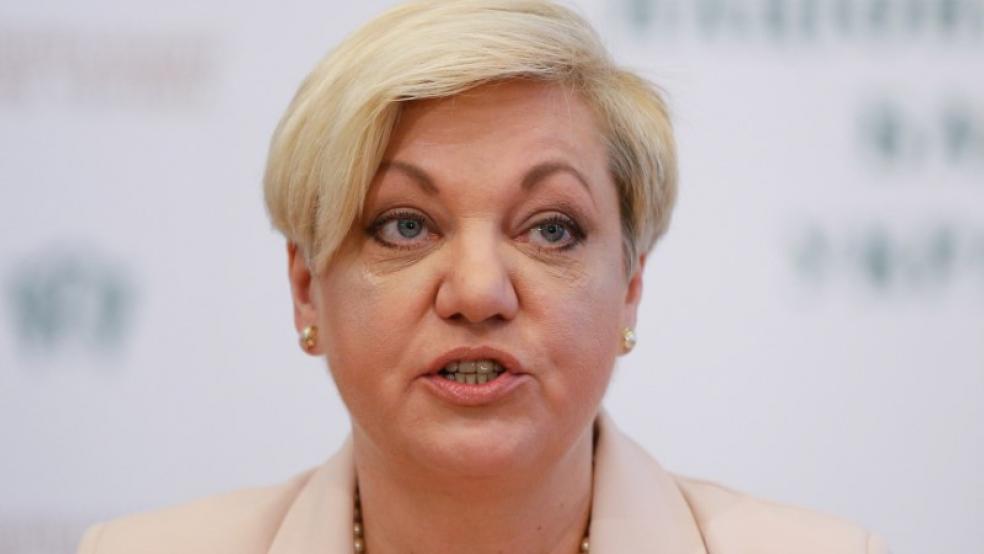KIEV (Reuters) - Ukraine risks not receiving loans worth $1.3 billion that it is awaiting from the International Monetary Fund before the end of 2016, due to parliament's reluctance to pass key reforms, the head of the central bank told Reuters on Tuesday.
This year the central bank has twice had to lower its end-2016 foreign reserves forecast after political infighting and sluggish reform progress delayed the disbursement of financial aid under the $40 billion IMF-led bailout program.Now, the release of a fourth tranche of IMF loans - worth $1.3 billion - could also be postponed."There are risks that we will not manage to receive it this year," Governor Valeriia Gontareva said.If Ukraine does not receive the IMF cash and an additional $700 million from the European Union this year according to the schedule, year-end reserves will stand no higher than the present $15.5 billion - $2 billion below the latest forecast, she said.With at least $2.5 billion in coupons and debt repayments due in 2017, "we can see how our reserves start to melt before our eyes. Our last 2-1/2 years of work stabilizing the situation, raising reserves, stabilizing the macroeconomy, starts to evaporate," she said.Gontareva was appointed by President Petro Poroshenko in 2014 to guide the central bank through an economic crisis that has been aggravated by separatist conflict in Ukraine's industrial east.COOPERATION 'ESSENTIAL'She said the bank had carried out its promises to the IMF under the aid-for-reforms program, including a clean-up of the banking sector, and that the blame for the current delays lay with parliament. "The central bank is responsible for its territory, unfortunately we can't do pension and land reform etcetera," she said. It was the responsibility of parliament to pass these changes and the budget, she said.Populist factions in parliament oppose legislative changes, required by the IMF, that would cut the large pension deficit and further liberalize the agricultural sector. They argue that austerity measures under the IMF program have done more harm than good, and say Ukraine would be better off going it alone. Gontareva said this is an "illusion"."I don't want anyone to doubt that for financial stability it is essential to continue cooperating with the IMF and our other supporters," she said.Loans from Ukraine's other Western backers are conditional on it sticking to the IMF reforms and not backtracking on its promises to root out the entrenched corruption and cronyism that helped push it to the brink of bankruptcy.On Monday, former Georgian president Mikheil Saakashvili tendered his resignation as governor of the southern Odessa region, accusing Poroshenko of cynically obstructing his attempts at reform and supporting corrupt clans.BIGGEST LENDERGontareva was tight-lipped about the outlook for Privatbank, Ukraine's largest lender, which has been the subject of reports it could be nationalized.She said the majority of Ukraine's 18 largest banks had met a September deadline for improving capital ratios and cutting related-party lending, but "Privatbank is big, so verification is going on there at the moment.""The central bank is a well-built organization and plans everything - everything is under control," she said when asked about her views on the status of Privatbank, declining to give further details.Francis Malige, managing director for Eastern Europe and the Caucasus at the European Bank for Reconstruction and Development, told Reuters the central bank had done a "first-class" job on reforming the banking system - a clean-up that involved closing over 80 insolvent lenders."But there's one issue left - the Privatbank case ... If capital needs to be replenished, capital needs to be brought in. If the current shareholders can't, then the bank needs to be nationalized," he said.In the interview, Gontareva dismissed recent political attacks against her as vendettas by lawmakers and businessmen who have lost out through the banking reforms, but she expressed concern that parliament could disrupt the IMF program by watering down approved reform legislation with amendments."What worries us are the laws that could be passed," she said, pointing to draft legislation that would alter an IMF-backed law on the independence of the central bank that parliament passed last year to secure a loan tranche worth $1.7 billion. (Editing by Mark Trevelyan)Ukraine parliament inaction puts $1.3 billion IMF loan at risk - central bank chief

VALENTYN OGIRENKO



